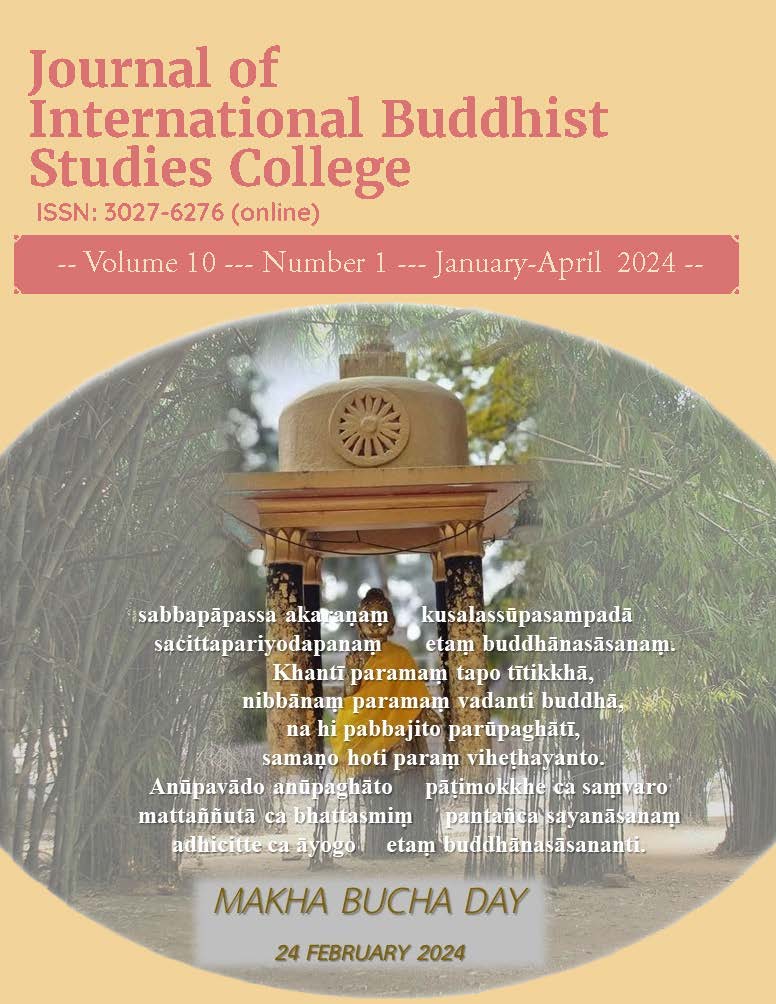Characteristics of Buddhist Politicians for Public Interest Devotion in Thai Society
Main Article Content
Abstract
This article aimed to (1) explore the issues facing Thai politicians and the concept of public interest, (2) explore Buddhist teachings relevant to politicians, (3) present the characteristics of Buddhist politicians for public interest devotion in Thai society. The data collection tool utilized for this research involved conducting in-depth interviews with ten key informants, including four senior monks, one former Prime Minister, and four scholars. The analysis of the gathered data was conducted through the method of content analysis. The findings of the study revealed the following:
- The challenges confronting Thai politicians encompass various ethical dilemmas present in their behaviors, communication, and mindset. These challenges revolve around issues such as conflicts of interest and instances of corruption. Furthermore, the exploration of public interest entails an examination of the realm of politics, the conduct of politicians, and their ethical obligations, all of which have the potential to give rise to conflicts of interest and corrupt practices.
- The Buddhist teachings that hold relevance for politicians encompass a wide array of guidance for the functioning of political systems. These teachings include concepts such as (1) lddhipāda (Path of Accomplishment), (2) Brahmavihāra (Sublime States of Mind), (3) Kusala-kammapatha (Wholesome Course of Actions), (4) Dassa-rājadhamma (Virtues of the Rulers), (5) Cakkavatti-vatta (Duties of a Great Ruler), (6) Rāja-sangaha-vatthu (Bases of Sympathy), (7) Agati (Wrong Courses of Behavior), (8) Sappurisa-dhamma Qualities of a Genuine Person, (9) Aparihāniya-dhamma (Things Leading Never to Decline but Only to Prosperity),and (10) Attha (Benefit or Welfare).
- The characteristics defining Buddhist politicians who are dedicated to public interest within Thai society encompass ethical and moral aspects, behavioral traits, mental attributes, and a perspective centered on public welfare. These characteristics include qualities such as being a just ruler, possessing trustworthiness, engaging in righteous conduct in both speech and actions, demonstrating active participation, upholding a commitment to justice, embracing a sense of responsibility, displaying passion and dedication, adhering to a particular ideology, exercising sound judgment, nurturing a mindset that prioritizes non-greed, embodying a spirit of devotion (social altruism), and exemplifying traits of loving-kindness. These four characteristics collectively embody the concept of "Bhāvitā," which comprises physical development (Bhāvikāya), moral development (Bhāvisīla), emotional or mental development (Bhāvicitta), and wisdom development (Bhāvipaññā).
In conclusion, the adoption of Buddhist principles by politicians is crucial for fostering a political environment characterized by integrity, accountability, and ethical behavior. This alignment not only addresses the immediate ethical challenges within governance but also promotes sustainable societal progress. Through these principles, politicians can effectively contribute to the creation of a just and harmonious society, benefiting all citizens and enhancing the overall quality of governance in Thailand.
Article Details
The Journal of TCI is licensed under a Creative Commons Attribution-NonCommercial-NoDerivatives 4.0 International (CC BY-NC-ND 4.0) licence unless otherwise stated. Please read our Policies page for more information on Open Access, copyright and permissions.
References
Aksotnsri, A. & Sangsuwon, W. (2021). Moral Standards of Politicians According to the Constitution of the Kingdom of Thailand B.E. 2560. Journal of Thammawa, .2(2) 1-8. https://so09.tci-thaijo.org/index.php/tmwj/article/view/646
Enste, D., & Heldman, C. (2017). Causes and consequences of corruption: An overview of empirical results. IW-Report, No. 2/2017, Institut der deutschen Wirtschaft (IW), Köln.
Harvey, P. (2000). An introduction to Buddhist ethics: Foundations, values and issues. Cambridge University Press.
Laiprakobsup, T. (2022). The analytical framework for the policymaking process of Thai political parties under the CESE model. Asian Journal of Comparative Politics, 7(4), 1247-1267.
Nachaisin, W., Phrakruworajittanurak, Phrakrusunthonwinairos, Thaotachan, H. & Kenthoraphak, P. (2023). Buddhist Politics Integrated for the Benefit and Peace of Society. Journal of Buddhistic Sociology, 8(4) 211-226.
Napikul, S. & Phrakruworawanwithun. (2022). The Enhauncement of Buddhist Ethics for Politicians.. Nakornlampang Sangha College Journal, 11(2) 155-165.
Pamutto, P. B., Thitapanyo, P. M., & Hanpong, P. (2023). Sovereignty according to Buddhist concepts. Russian Law Journal, 11(9S), 403-411.
Pannasil, P., Phosing, P., & Kenaphoom, S. (2016). Corruption in the Thai Bureaucracy: The Protection and Solution Approach. Journal of MCU Peace studies, 4(2), 326-340.
Phra Brahmagunabhorn (P. A. Payutto). (2011). Political Science and Ethics of Buddhist Politicians. Buddhadhamma Foundation.
Phra Brahmagunabhorn (P. A. Payutto). (2012), A Constitution for Living. (119th ed.). The Buddhism Printing of Thammasapa.
Phra Silasak Sumato, Phramaha Thainoi Yanamethi & Pookodhin, U. (2022). Ethics of Thai Politicians, Journal of Political Science Mahamakut Buddhist University. 2(3), 129-138.
Phrakrupaladsuwatthanaphromajariyakhun (Khammag). (2020). Buddhism and governance politics for development in Thai society. Panna Panithan Journal, 5(1) 1-14.
Phramaha Khuntong Khemasiri & Pratumkaew, S. (2021). Buddhist ways: the key to the Communication of the Thailand. Journal of Buddhist Studies Vanam Dongrak, 4(1) 63-74.
Phramaha Wiset Sorphobdee, Photisuwanpanya, T., Panyamak, S., Sathapanasuphakul, W., Somsri, M. (2021). The Politicians’ Buddhist Morality on Students’ Opinions at Mahamakut Buddhist University: Lanna Campus, Chiang Mai, Thailand. Psychology and Education, 58(1): 4451-4458
Sukjeen, A., Phramaha Sitthichai Chayasidhi, Sununtha, P., Khongthip, P. (2020). Leadership: Thai Politicians Ethics According to Buddhism. Nakornlampang Sangha College Journal, 9(3): 234-245.
Vichit-Vadakan, J. (2017). Public ethics and corruption in Thailand. In Public administration in Southeast Asia. Routledge.
Zhang, C. (2023). Buddhist Values Impact on Private and Public Behaviors in Thailand: A Mixed Method Research. Journal of Public Value, 33-43.


